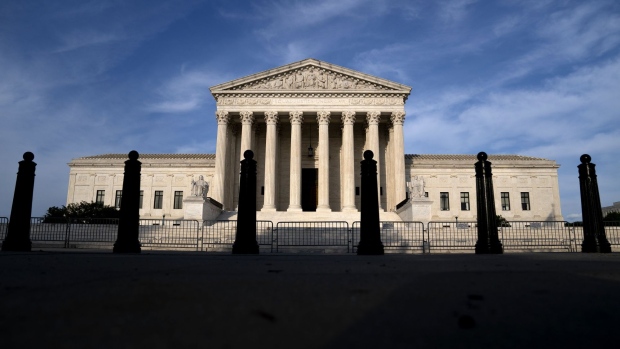The U.S. Supreme Court dealt a punishing blow to Fannie Mae and Freddie Mac investors in their challenge to the government’s collection of more than US$100 billion in profits from the government-sponsored enterprises.
The justices threw out a core part of the investors’ lawsuit, rejecting claims that the Federal Housing Finance Agency exceeded its authority under federal law. Fannie and Freddie cratered, each plunging the most in intraday trading since 2013.
Investors, the court said, might be able to win damages on a separate claim that some payments under the so-called profit sweep were illegal because the FHFA director was unconstitutionally insulated from being fired by the president. But the justices said they wouldn’t use that argument to toss out the entire profit sweep.
The justices sent the case back to the lower-court level, where the investors will have a chance to show they were harmed by the lack of presidential control over FHFA directors who implemented the agreements. But it means shareholders "can’t recover the bulk of the overpayments they sought," said Bloomberg Intelligence analyst Elliot Stein.
The decision is a setback for firms including Paulson & Co., Pershing Square Capital Management and Fairholme Funds Inc. that have sought for years to persuade the government to release Fannie and Freddie from government control, thereby earning billions of dollars on their shares.
Fannie Mae’s common shares slumped as much as 45 per cent, while Freddie Mac tumbled as much as 46 per cent. Trading volumes in both stocks surged; by midday, each had topped more than 10 times its recent full-day average.
Firing Calabria
The ruling means President Joe Biden will be able to oust Mark Calabria, the FHFA director and an advocate for releasing the mortgage giants from government control. The White House, which announced Wednesday it will immediately move to oust Calabria, will face pressure to replace him with someone more likely to allow Fannie and Freddie to ease mortgage credit.
"This will allow the Biden administration to finally put an end to the course that Calabria has the nation’s mortgage market on, much to the relief of progressives and industry alike," said Jim Parrott, who is a consultant for financial firms and was a senior housing adviser in the Obama White House when the net worth sweep was implemented.
In a statement, Calabria said he respects the Supreme Court’s decision and wishes his successor all the best in fixing the remaining flaws of the U.S.’s housing finance system.
The suing investors targeted the 2012 agreements between the FHFA and Treasury Department. The accords let the federal government collect more than US$300 billion in profits from Fannie and Freddie. That included US$124 billion the investors said was an unwarranted windfall, beyond what the Treasury would have netted under earlier accords.
Brandon Barford, a partner at policy-research firm Beacon Policy Advisors, called the decision a "profound rejection" of most of the shareholders’ claims, though he expected some shareholders to continue to fight "knowing the tenacity of those who feel they’ve been wronged."
In his opinion for the Supreme Court, Justice Samuel Alito said the 2008 law that set up the FHFA limits lawsuits that challenge the profit sweep. The law bars courts from doing anything to "restrain or affect the exercise of powers or functions of the agency as a conservator."
Alito said that provision applied because the FHFA was acting as a conservator when it agreed to the profit sweep.
"When the FHFA acts as a conservator, it may aim to rehabilitate the regulated entity in a way that, while not in the best interests of the regulated entity, is beneficial to the agency and, by extension, the public it serve," Alito wrote. "This distinctive feature of an FHFA conservatorship is fatal to the shareholders’ statutory claim."
Suit Limited
Alito said Congress violated the Constitution with a 2008 law that said the FHFA director can be fired only for cause. He said the case was similar to the Supreme Court’s 2020 ruling striking down similar job protections for the director of the Consumer Financial Protection Bureau.
The removal power "works to ensure that these subordinates serve the people effectively and in accordance with the policies that the people presumably elected the president to promote," Alito wrote.
But Alito said that flaw didn’t mean the profit sweep needed to be invalidated, in part because the FHFA was headed by an acting director, Edward DeMarco, at the time the agreements were signed. Alito said the job protections don’t cover acting directors.
Alito said the investors could seek damages only for actions taken by FHFA directors who were nominated by the president and confirmed by the Senate. The Senate confirmed Mel Watt to take over for DeMarco starting in January 2014.
He said the possibility shareholders might have been harmed by the unconstitutional provision "cannot be ruled out." Alito pointed to the investors’ contention that, with presidential oversight, a Senate-confirmed director "might have altered his behavior in a way that would have benefited the shareholders."
The various issues in the case splintered the nine justices. Justices Sonia Sotomayor and Stephen Breyer dissented from the part of the ruling that declared the FHFA director’s job-removal protections unconstitutional.
The lead case is Collins v. Yellen, 19-422.
--With assistance from Felice Maranz.








